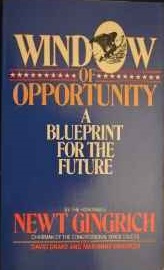|
OnTheIssues.org BOOK REVIEW:
We read this book in the summer of 2016 because we thought Newt Gingrich was a top prospect as Donald Trump's vice president --Newt was reported to be in the final three, along with Mike Pence and Chris Christie. Then we thought that Gingrich was a top prospect for Donald Trump's Cabinet. That didn't happen either -- Newt instead will work with strategic planning for the Republican Party instead of the Trump administration. Newt remains influential with Donald Trump and we write this book review with the concept in mind that Newt will be a Trump adviser outside of the Administration.
This book's subtitle, "A Blueprint for the Future," indicates that Newt was outlining a "blueprint" for his successful 1994 takeover of Congress. The book's main title, "Window of Opportunity," focuses on conservative solutions instead of "today's welfare state [which] threatens to cut off the poor from technological opportunities... We want all our children to participate in the 'opportunity society' this book describes." (p. 1). The "opportunity society" is likely to be a conceptual focus of the Trump Administration too -- so this book provides a historical context for the previous conservative takeover of Congress (we consider the George W. Bush era to be a neocon takeover, a group that despises Trump but likes Newt).
Newt considers himself a future-oriented "big-picture" thinker. Newt's intellectual guides and heroes include Alvin Toffler, a popular non-fiction writer, and Peter Drucker, a popular business writer. On page 2-4, Newt writes that "Alvin Toffler suggests, in his book The Third Wave, that an information society will require 'Triliteracy,' a combination of 1) the old three R's or reading, writing, and arithmetic; 2) the use of mass media; and 3) the use of computers... Think back to the period before electricity, chemistry, and the internal-combustion engine revolutionized our world--now we are standing on the verge of a technological breakthroughs as significant as any which transformed the dreams of that generation." Obviously Newt was right in his prediction of the importance of the Internet (it wasn't called that in 1994!), which puts us today in the middle of the predicted transformation. President-elect Trump embodies the first post-Internet social media presidency (President Obama famously used a Blackberry, which feels as ancient in 2016 as Newt's discussion of "the electricity revolution.'")
On the business side, Newt writes on p. 119 that "An opportunity society would reverse the welfare state's focus on victimization. Most Americans instinctively believe in the dictum Peter Drucker has enunciated: that real progress is made by building from strength. Drucker argues that all great managers know that focusing on weakness is a sure road to ruin." Newt concludes that "The opportunity society is almost the reverse of the welfare state: by focusing on opportunity and strength rather than victims and welfare, we open up options and opportunities unthinkable inside the welfare-state framework" (p. 120). That means, in the context of a Trump Administration, the dismantling of the welfare "safety net" in favor of market-oriented options. It's unclear in late 2016 how much Trump believes that -- but Newt certainly does!
Newt is by no means a policy prophet. Sometimes he doesn't even get it right on the "big picture": which we can see clearly in retrospect from two decades after he wrote this book. For example:
- "We must expect the Soviet system to survive in its present brutish form for a very long time" (p. 221) – the Soviet Union collapsed in 1989, only 5 years after Newt published this book – not "very long" at all, to any "big thinker".
- "It is quite conceivable that Pakistan and India would use nuclear weapons on each other, or that the PLO will find some new biological or chemical weapon to use on Israel" (p. 218). India and Pakistan were just developing their nuclear programs in 1994 -- but they have refrained from their use, even during their armed conflict in 1999 after both had exploded test nuclear devices -- in other words, they have settled into "détente" just like the USA and USSR did during the Cold War. And the PLO (the "Palestinian Liberation Organization," it is now necessary to write, although that was unnecessary in 1994) formally disbanded in 1995 with the Oslo Accords -- certainly the Palestinian Authority is not at peace with Israel, but WMD have never become their tools of choice.
- "The containment thesis posited that, if we blocked Soviet expansion, their situation would gradually mellow and liberalize. This view is, in retrospect, one of remarkable naivete" (p. 220). This view is why the neocons like Newt (counseling a muscular response over diplomacy) but with a few more years' retrospective, "containment" ultimately worked.
|
Newt asserts his beliefs as unquestionable facts, both for those that proved right over time equally with those that proved wrong in the long term. Every pundit has a track record like Newt's -- including OnTheIssues -- a 50/50 chance of being right, so that flipping a coin is as good a prediction tool as political punditry. What matters isn't which predictions Newt got right and which he got wrong -- what matters is which ones Trump will follow. In the spirit of political punditry, we assert that Trump will certainly follow SOME of Newt's thinking.
-- Jesse Gordon, editor-in-chief, OnTheIssues.org, Dec. 2016
|












